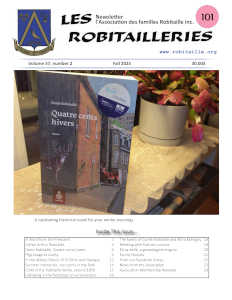Could we be of Basque extraction?
By C.M. Robitaille, pastor of Saint Edward the Confessor Parish, Willowdale, OntarioIf I had more time, I would make a more concerted effort to examine the possibility that the Robitaille family is of Basque origin.
On two separate occasions, two Spanish priests, on meeting me for the first time, immediately said to me, "Robitaille! Basque, pure Basque."
On another occasion, a good lady from France, on learning my name, said that I was certainly Basque, both by name and physiognomy.
On yet another occasion, while visiting California and entering a restaurant which called itself a Basque restaurant, and whose customers came directly from the Basque region of Spain, I said to them:
- "Is the name Robitaille of Basque origin?
- Certainly.
- Is the name fairly common among the Basques?
- Definitely.
- Is it the most common name?
- No.
- What is the most common name?
- Etcheverria."
Here's another example of something that could give one the desire to pursue research on this subject, not an undersea treasure, but a treasure trove of information. Geoffrey H. Farmer, from the Memorial University of Newfoundland, tells the story of Mrs. Selma Huxley Barham. While she was visiting Red Bay in Newfoundland, Mrs. Barham noticed that pieces of tile she found on the beach oddly resembled the red tiles used in Basque country. She later found, in the archives of the ancient University of Onate, a small Basque city, the will of a certain Joanes de Echaniz who had died aboard a ship in Red Bay.
This discovery led to the confirmation of Red Bay as a New World site used by the Basques in the 16th century, to the discovery of the galleon San Juan, and to the establishment of a national historic site.
If the Basque insurance archives are sufficiently comprehensive to include mention of a shipwreck in Red Bay, Newfoundland, might it be possible to find the name Robitaille in those archives?
From what your organization has published to date, the history of the Robitailles from Hesdin dates only from the return to France of one of our ancestors' brothers. Where were they before 1650?
Editor's Note: According to the ASP, the Basques were not the only ones to have come to North America before many others. They could also have been the oldest inhabitants of Europe. It has been known for some time that the language of the Basque people, whose territory spans France and Spain, were unique in their origins: they are the only inhabitants of Europe who were not of Indo-European origin. Genetic analysis shows that their DNA is found only in a few neighboring populations. What this means is not only that their origins are different from those of their neighbors, but also that they were more successful at resisting the intermixing of races that has been the lot of Europe for thousands of years.







